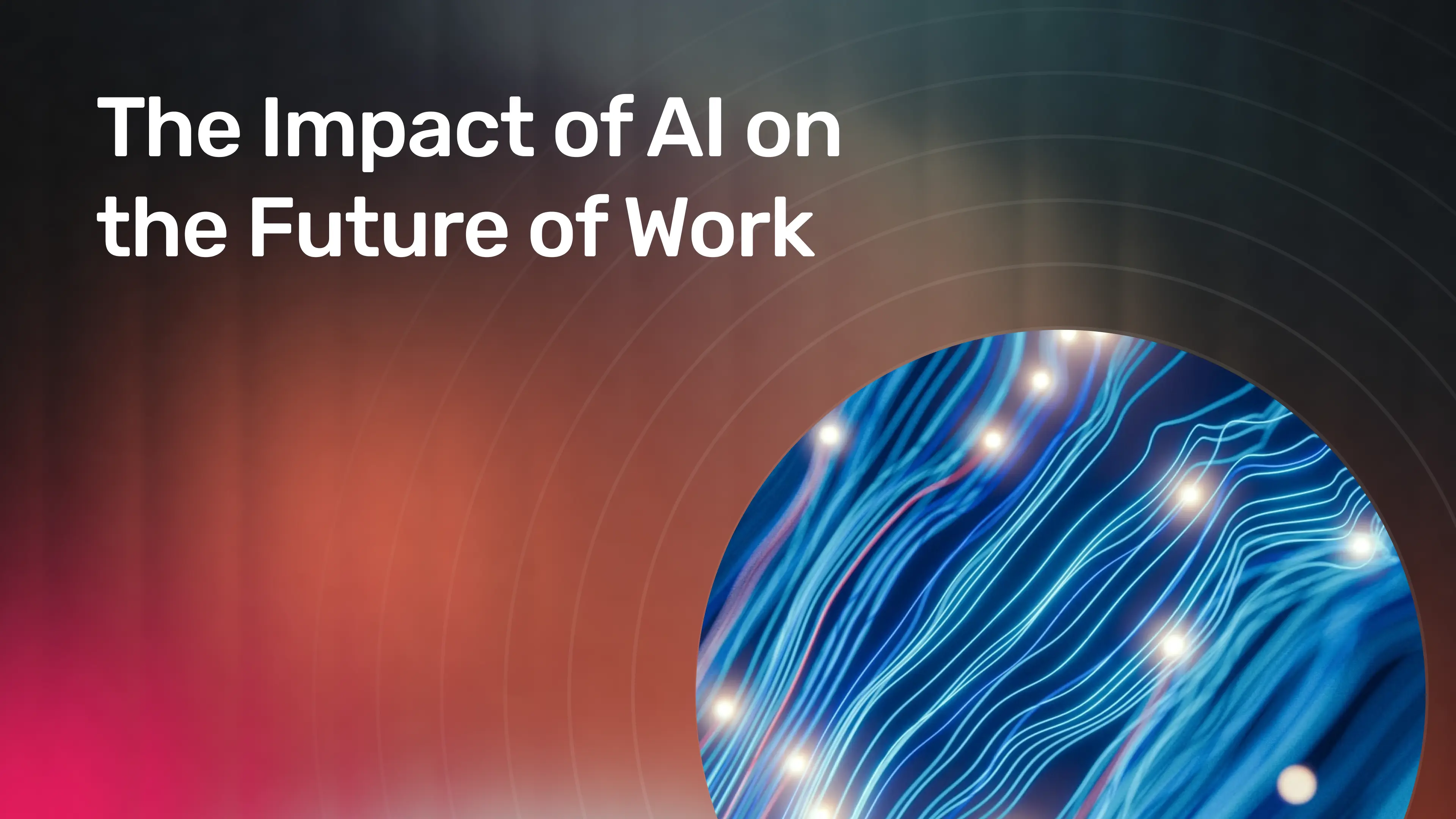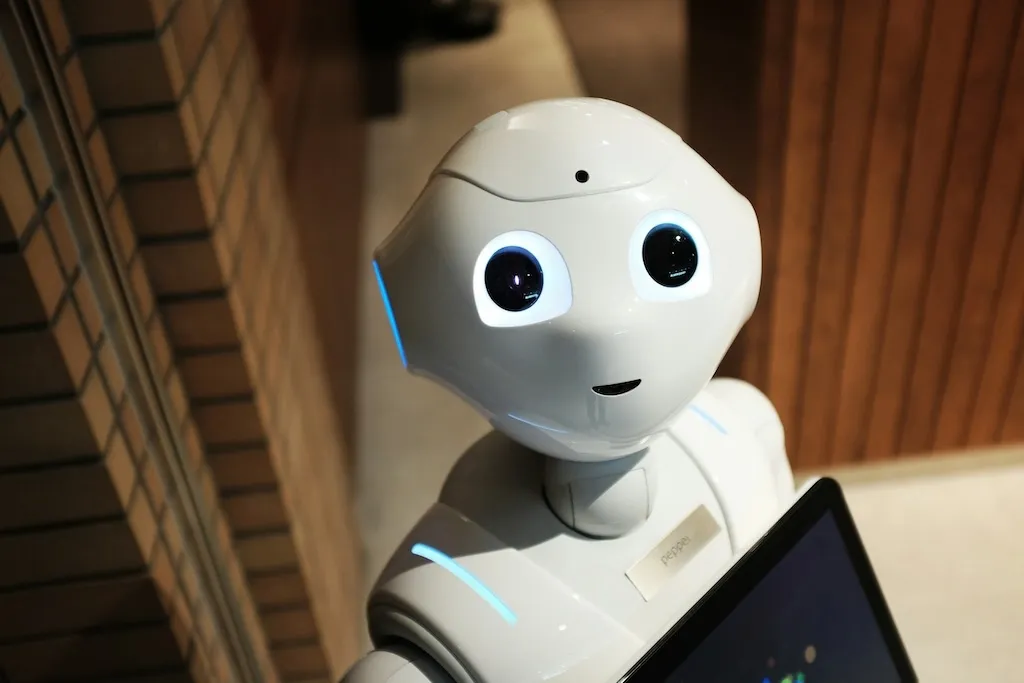The Impact of AI on the Future of Work
Every technological advancement has sparked burning questions for the future of work — will it complete problem-solving tasks? Or when will the takeover happen, leaving tons of professionals without jobs?
Let’s leave the guessing game aside and dive into how AI has impacted the workforce so far and contributed to the creation of new jobs. We’ll also cover tips on how you can prepare your business to thrive in the never-ending AI innovation sphere.

Why is AI important for the future of work
The shift towards AI implementation frees up space for higher-value activities that require creativity, emotional intelligence, and strategic thinking. As AI takes over repetitive tasks, the number of errors gets reduced, productivity will spike, and as a result, so will the speed of processes. This acceleration can be seen with the AI-powered chatbots, which significantly reduce the workload of customer support representatives.
For businesses, this change brings more operational efficiency and cost-effectiveness. At the same time, workers will need to develop new skills to work alongside AI systems, which could lead to hybrid roles that combine human judgment with AI-powered tools.
You might be interested in learning about top strategies for improving work productivity.
The impact of AI on the workforce
As businesses rapidly adopt AI technologies, workers must adapt to new realities that bring both challenges and opportunities. Here's how AI is reshaping the workforce.
Job displacement and creation
While it’s no secret that AI could replace many jobs, there’s also a high probability that it’ll create new ones in certain industries. With many companies embracing AI, roles in machine learning and data analysis are expected to be in growing demand. Industries from healthcare to manufacturing are also seeing new roles emerge that combine domain expertise with AI capabilities.
Upskilling and reskilling
Technical literacy, data analysis, and AI system management are becoming essential skillset across industries. Companies are investing in training programs to help employees transition to AI-augmented roles. The focus is shifting from memorising information to developing skills in critical thinking, creativity, and complex problem-solving. To build these capabilities, modular, hands-on curricula that span prompt engineering, generative AI, and responsible AI are effective for example, professionals can study AI on Datacamp to progress from fundamentals to applied tools used in modern workflows.
Collaboration between humans and computers
The future workplace isn't about AI replacing humans – it's about effective human-AI collaboration. Workers are learning to use AI as a tool that improves their capabilities rather than threatens their jobs. This means understanding AI's strengths and limitations and developing workflows that optimise the strengths of both humans and machines.

What types of jobs will AI create?
Thanks to AI, workers can easily explore new career paths and opportunities across industries. Let’s take a look at the emerging job positions that have spurred in the AI era.
AI Specialists
AI Specialists are essential to designing, developing, and maintaining AI systems that drive modern businesses forward. Their expertise lies in solving complex issues, such as improving AI model accuracy and reducing computational costs.
Drawing from their technical knowledge of machine learning algorithms and programming languages, AI Specialists are often tasked with developing applications ranging from natural language processing to computer vision.
Data Scientists and Analysts
With AI generating massive amounts of data, these experts turn raw information into actionable insights. They clean and prepare data, build predictive models, and help businesses make data-driven decisions.
Data scientists combine statistical analysis with programming skills to extract patterns from complex datasets. They work closely with business teams to ensure AI solutions address real business needs.
AI Trainers
AI trainers bridge the gap between human behavior and machine learning, often pursuing credentials like Claude AI certification to formalize their expertise in this emerging field. They teach AI systems to understand context, improve accuracy, and reduce biases in areas like language processing and image recognition.
This role requires a unique blend of technical understanding and human insight. AI trainers often work on improving chatbots, virtual assistants, and other AI interfaces to make them more natural and effective. For many professionals, this work translates into a training AI chatbot job, where they actively refine conversational flows, correct AI misunderstandings, and help systems deliver more accurate, human-like responses across real-world use cases.
AI Integration Specialists
These professionals specialize in AI Integration Services, helping businesses seamlessly implement AI solutions into their existing workflows. They assess company needs, select the most suitable generative AI tools, and manage the entire integration process. They collaborate with various departments to ensure the smooth adoption of AI technologies and provide staff training on new AI-powered systems to maximize efficiency and effectiveness.

How are businesses preparing for the future with AI?
Companies are rapidly evolving their strategies to capitalise on AI's potential while managing its challenges. The transition requires careful planning, investment, and organisational change to ensure successful AI integration across operations.
Adopting AI technologies
Nowadays, most businesses start implementing AI with focused projects in areas like customer service chatbots, predictive analytics for sales, AI-powered eCommerce catalog management or inventory management. This helps build scalable cloud infrastructure and data pipelines to support decision-making and automate processes.
Investing in training and development
Launching comprehensive training programs is a great way for businesses to prepare their workforce for AI integration. This includes technical training on AI tools and platforms, data literacy courses, and workshops on AI-human collaboration. AI also brings to light certain skill gaps, which businesses can identify and create personalised learning paths for different roles.
Collaborating with AI experts
Staying current with the latest AI trends also requires networking with AI experts. This can be done through strategic partnerships with top artificial intelligence consulting firms, AI vendors, academic institutions, and industry experts. Many businesses even establish AI advisory boards to guide their strategy and implementation instead of outsourcing it or conducting the research themselves.
Changing organisational structures
Embracing AI integration means fundamentally reshaping organisational structures. New positions, such as Chief AI Officer and AI Ethics Officer, should be appointed, cross-functional AI teams created, and a different reporting structure implemented.
Establishing ethical AI policies
AI sets ethical questions about who is responsible for its decisions or how we can be sure they’re morally right. Hence, the need for creating clear guidelines for data handling, algorithmic fairness, and AI transparency is more important than ever. It’s also important to establish regular training so that all employees understand and follow these ethical guidelines.
Learn more about which technology has helped the gig economy grow.

Navigating the future of work with AI
With AI developing faster than the speed of light, success depends on working with these tools, not against them. Here are a few tips that can help you master AI and thrive in the modern workplace.
Embracing AI as a tool
Think of AI as an enhancer of your work rather than a replacement. Once you’ve mastered the prompts, you can use AI to automate repetitive tasks, analyse data, and take advantage of tools like an AI presentation generator to create initial drafts. This saves you a lot of time from manual work, which can now be used to polish up and add more creativity to the AI output.
Developing human-centric skills
The rise of AI makes distinctly human capabilities more valuable than ever. These include emotional intelligence, which drives effective leadership and relationship building, alongside the ability to think strategically and solve complex problems. The most successful professionals will be those who excel at these skills, which AI can’t replicate.
Ethical AI development
Success in ethical AI development comes from recognising when to rely on AI and when human judgment is essential while consistently protecting user privacy and maintaining fairness in AI-driven processes. This means establishing clear protocols for data privacy and actively monitoring for potential biases.
Looking for a trusted AI development company? Check out AI Development Companies & AI Developers in the USA

To wrap up
AI isn't just changing how we work — it's revolutionising entire industries and creating new opportunities. While some jobs will transform or disappear, new roles are emerging that combine human expertise with AI capabilities.
Success in this AI-driven future requires a balanced approach: embracing AI as a powerful tool, developing uniquely human skills, and ensuring ethical implementation. The future of work isn't about humans versus AI — it's about humans and AI working together to achieve greater potential.
